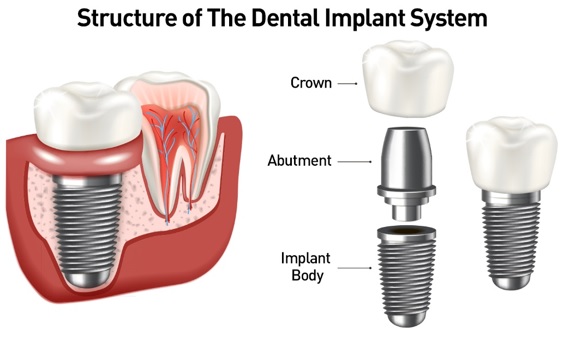Learn how dental implants can restore your smile and change your life.
Dental Implants | Forest Hills
"dental implants can replace missing teeth, either as single, multiple or all-on-5 with a full arch ."
Dental implants are prosthetic tooth roots that are surgically placed into the jawbone to replace missing teeth. They provide a strong foundation for attaching artificial teeth, such as crowns, bridges, or dentures, restoring both the appearance and function of natural teeth. Dental implants are typically made of biocompatible materials, most commonly titanium, which allows them to fuse with the jawbone through a process called osseointegration. The process of receiving dental implants involves several steps:
The Initial Evaluation as a candidate for dental implants
Initial Evaluation: During the initial consultation, a dental professional, typically an implant dentist or oral surgeon, will examine your oral health, review your medical history, and assess the suitability of dental implants for your specific case. This evaluation may involve X-rays, 3D scans, or other imaging techniques to determine the quality and quantity of your jawbone. Implant Placement: If you are deemed a suitable candidate for dental implants, the next step is the surgical placement of the implant into the jawbone. Under local anesthesia or sedation, the oral surgeon or implant dentist will make an incision in the gum tissue to access the underlying bone. They will then drill a small hole in the bone and carefully place the implant into the prepared site. The gum tissue is then stitched back in place, covering the implant.

Abutment Placement: Once osseointegration is complete, a minor surgical procedure may be required to expose the implant and attach a connector called an abutment. The abutment serves as a link between the implant and the prosthetic tooth or teeth. Restoration: After the gums have healed and the abutment is in place, the final step is the fabrication and placement of the artificial teeth. Depending on the number of missing teeth and your specific needs, your dentist will create customized crowns, bridges, or dentures that will be attached to the implants. These prosthetic teeth are designed to match the appearance and function of natural teeth, providing a natural-looking and comfortable solution.
Dental implants offer numerous benefits, including improved chewing ability, enhanced speech, durability, and a more aesthetically pleasing smile. They are designed to be long-lasting, with proper care and maintenance, potentially lasting a lifetime.
It's important to consult with a qualified dental professional to undergo a thorough evaluation and discuss the specifics of your case to determine if dental implants are the right tooth replacement option for you.
Abutment Placement: Once osseointegration is complete, a minor surgical procedure may be required to expose the implant and attach a connector called an abutment. The abutment serves as a link between the implant and the prosthetic tooth or teeth. Restoration: After the gums have healed and the abutment is in place, the final step is the fabrication and placement of the artificial teeth. Depending on the number of missing teeth and your specific needs, your dentist will create customized crowns, bridges, or dentures that will be attached to the implants. These prosthetic teeth are designed to match the appearance and function of natural teeth, providing a natural-looking and comfortable solution.
Contact the office of The Center for Implant Surgery to make an appointment to discuss dental implants.
Call us on 718-261-2790 for an appointment or make an appointment using the scheduler


